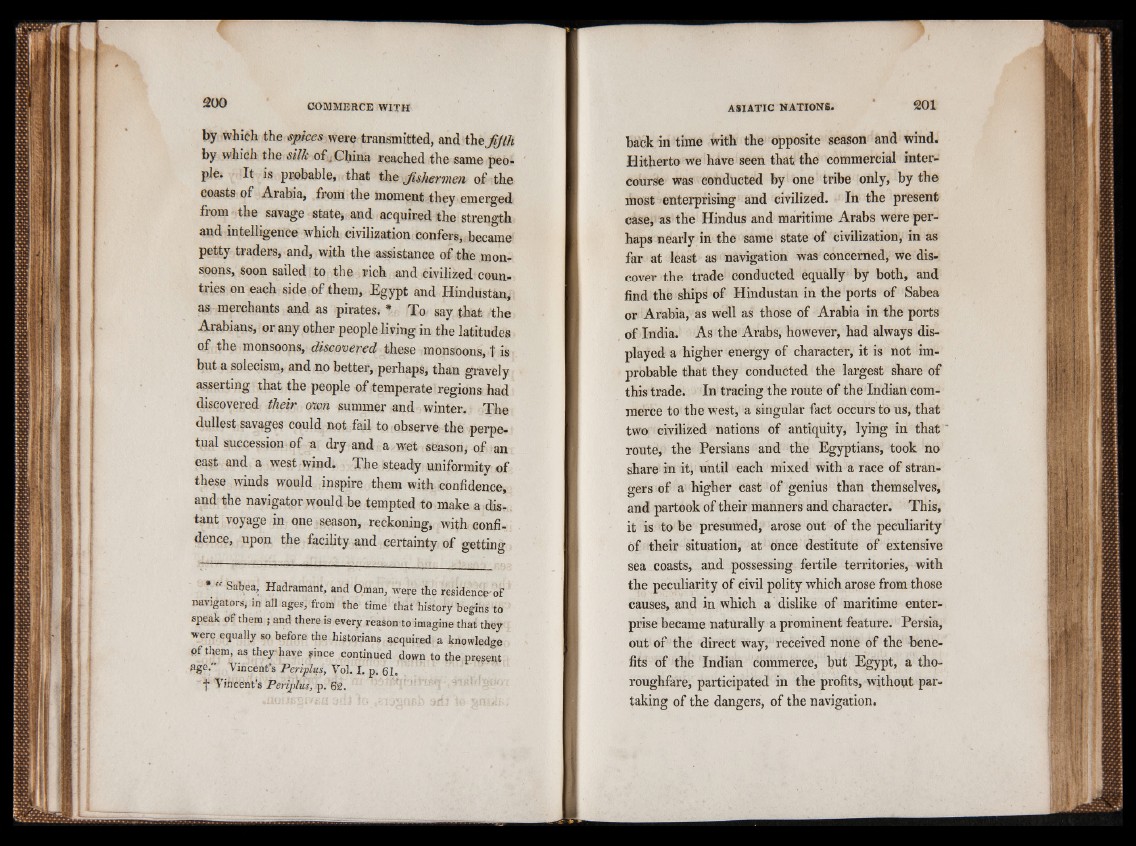
by which the spices were transmitted, and thejijth
by which the silk of, China reached the same people.
It is probable, that the ^fishermen of the
coasts of Arabia, from the moment they emerged
from the savage state, and acquired the strength
and intelligence which civilization confers, became
petty traders, and, with the assistance of the monsoons,
soon sailed to the rich and civilized countries
on each side of them, Egypt and Hindustan,
as merchants and as pirates. * To say that the
Arabians, or any other people living in the latitudes
of the monsoons, discovered these monsoons, t is
but a solecism, and no better, perhaps, than gravely
asserting that the people of temperate regions had
discovered their own summer and winter. The
dullest savages could not fail to observe the perpetual
succession of a dry and a wet season, of an
east and a west wind. The steady uniformity of
these winds would inspire them with confidence,
and the navigator would be tempted to make a distant
voyage in one season, reckoning, with confidence,
upon the facility and certainty of getting
* ; ■ Sabea, Hadramant, and Oman, were the residence-of
navigators, in all ages, from the time that history begins to
speak of them ; and there is every reason to imagine that they
were equally so before the historians acquired a knowledge
of them, as they have gince continued down to the present
age." Vincent s Peri-plus, Vol. I. p. 61.
f Vincent’s Periplus, p. 62,
back in time with the opposite season and wind.
Hitherto we have seen that the commercial intercourse
was conducted by one tribe only, by the
most enterprising and civilized. In the present
case, as the Hindus and maritime Arabs were perhaps
nearly in the same state of civilization, in as
far at least as navigation was concerned, we discover
the trade conducted equally by both, and
find the ships of Hindustan in the ports of Sabea
or Arabia, as well as those of Arabia in the ports
of India. As the Arabs, however, had always displayed
a higher energy of character, it is not improbable
that they conducted the largest share of
this trade. In tracing the route of the Indian commerce
to the west, a singular fact occurs to us, that
two civilized nations of antiquity, lying in that
route, the Persians and the Egyptians, took no
share in it, until each mixed with a race of strangers
of a higher cast of genius than themselves,
and partook of their manners and character. This,
it is to be presumed, arose out of the peculiarity
óf their situation, at once destitute of extensive
sea coasts, and possessing fertile territories, with
the peculiarity of civil polity which arose from those
causes, and in which a dislike of maritime enterprise
became naturally a prominent feature. Persia,
out of the direct way, received none of the benefits
of the Indian commerce, but Egypt, a thoroughfare,
participated in the profits, without partaking
of the dangers, of the navigation.